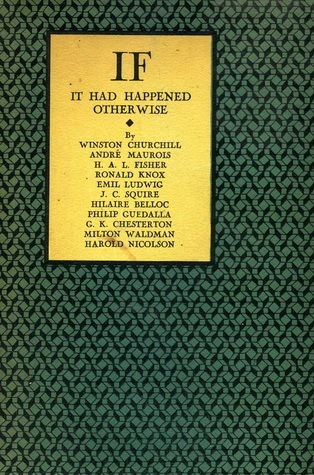What do you think?
Rate this book


320 pages, Hardcover
First published January 1, 1931
If, or History Rewritten, edited by JC Squire, 1931 379pp, is a collection (maybe the first such) of 11 counterfactuals:
Introduction by JC Squire describes the concept of alternate history, and notes some of the ones in this anthology are good guesses about what could have happened, others being more fanciful.
If the Moors in Spain Had Won by Philip Guedalla presents a series of historical documents showing how Granada being a separate Moorish kingdom to Spain, The independent Granada is entirely plausible, however the subsequent success story sounds optimistic.
If Don Juan of Austria Had Married Mary Queen of Scots by GK Chesterton, who starts with a talk on love stories and Genesis. Mary had several suitors, and although Don Juan was not one of them (but Chesterton mentions a quote that he intended to carry her off), he could easily have been. Don Juan marrying Mary, though unlikely, was not impossible and would certainly helped Mary’s cause and opposed Turkish interests,
If the Dutch Had Kept Nieuw Amsterdam by Hendrik Wilhelm Van Loon suggests it could have remained independent until the 19th century On the whole, it seems unlikely to have remained independent so long as suggested here, but then there wouldn’t be a story to narrate, and he wouldn’t be able to make his comments on Prohibition and the right to drink alcohol.
If Louis XVI Had Had an Atom of Firmness by Andre Maurois, says he could have implemented Turgot’s proposed reforms, had he stood up to Marie Antionette’s opposition. Well-thought out, detailed, and not too implausible – if Louis continued to back Turgot.
If Drouet’s Cart Had Stuck (by Hilaire Belloc) then Louis XVI would have escaped in 1791, the French monarchy survived and the revolution put down. All related in a series of articles and letters. Detailed and generally plausible,
If Napoleon Had Escaped to America (by HAL Fisher) he could have been a popular figure there, espousing revolution and independence for Spanish possessions. It’s reasonable to suppose Napoleon and his ideals could have influenced events in South America had he escaped, but the outcome given here seems very speculative.
If Byron Had Become King of Greece by Harold Nicolson reviews the memoirs of the Duke of Negroponte. The main contention here is that Byron may have changed from experience had he survived, and his reputation become quite different.
If Lee Had Not Won the Battle of Gettysburg by Winston S Churchill is written as a counter-counter-factual; in the counter-factual world, Lee went on from winning Gettysburg to take Washington. The author’s contention that Lee would have had to do more to win the American civil war than take Washington is reasonable, and he had the standing to make the policy suggested, however implausible, and it may well have had the desired effect of successful secession.
If Booth Had Missed Lincoln by Milton Waldman is written as a hostile review of “Lincoln – A Vindication”. The author’s contentions are not unreasonable, and it is an interesting reminder that Lincoln need not have been regarded as the great American icon that he is.
If the Emperor Frederick Had Not Had Cancer (by Emil Ludwig) he could have ruled Germany for many years. The author’s contentions seem roseate, but Frederick would have been liberal and un-warlike; Germany and Europe would certainly have been very different with Frederick as Kaiser.
If It Had Been Discovered in 1930 That Bacon Really Did Write Shakespeare (by JC Squire) This is an amusing conceit and a satire on those promoting the theory of Bacon writing Shakespeare; although given the importance of these figures, proving such a theory would indeed create upheaval in some quarters.
Overall, these alternate histories all demonstrate how they could have occurred, and follow through the consequences, and in a way that is difficult to represent in a short story of equivalent length. Some are related through historical documents or letters, one by looking at the alternate history records held in Heaven, others as histories or reviews of histories, and one speculating on our history from the alternate view. So there is story in these, often working better than straight fiction. The subjects naturally represent the concerns of the time and the views of the authors, although they concern historical events that remain important and are still food for thought.